
The need for speed
Does haste make waste? … No experience necessary … 2026 is the year of Glassman.
Of the 143 bills Gov. Katie Hobbs vetoed in 2023, one contained the solutions Republicans are again pushing to truncate Arizona’s lengthy ballot-counting process.
Republican Sen. JD Mesnard championed the legislation to cut off early voting at 7 p.m. on the Friday before Election Day.
And he plans to start the 2025 legislative session with the same bill. While the idea is gaining traction, it’s still more than likely headed for another veto next year. But Republicans have a plan to get around that this time.
Dropping off an early ballot on Election Day is the second most popular way Maricopa County residents vote, per the Elections Department. This year, poll workers counted nearly 213,700 early and provisional ballots voters cast on Election Day.
Voters can cut the line of people voting their full ballots in person, and the process ensures our state’s biggest procrastinators can still cast their ballot if they didn’t mail or drop it off on time.
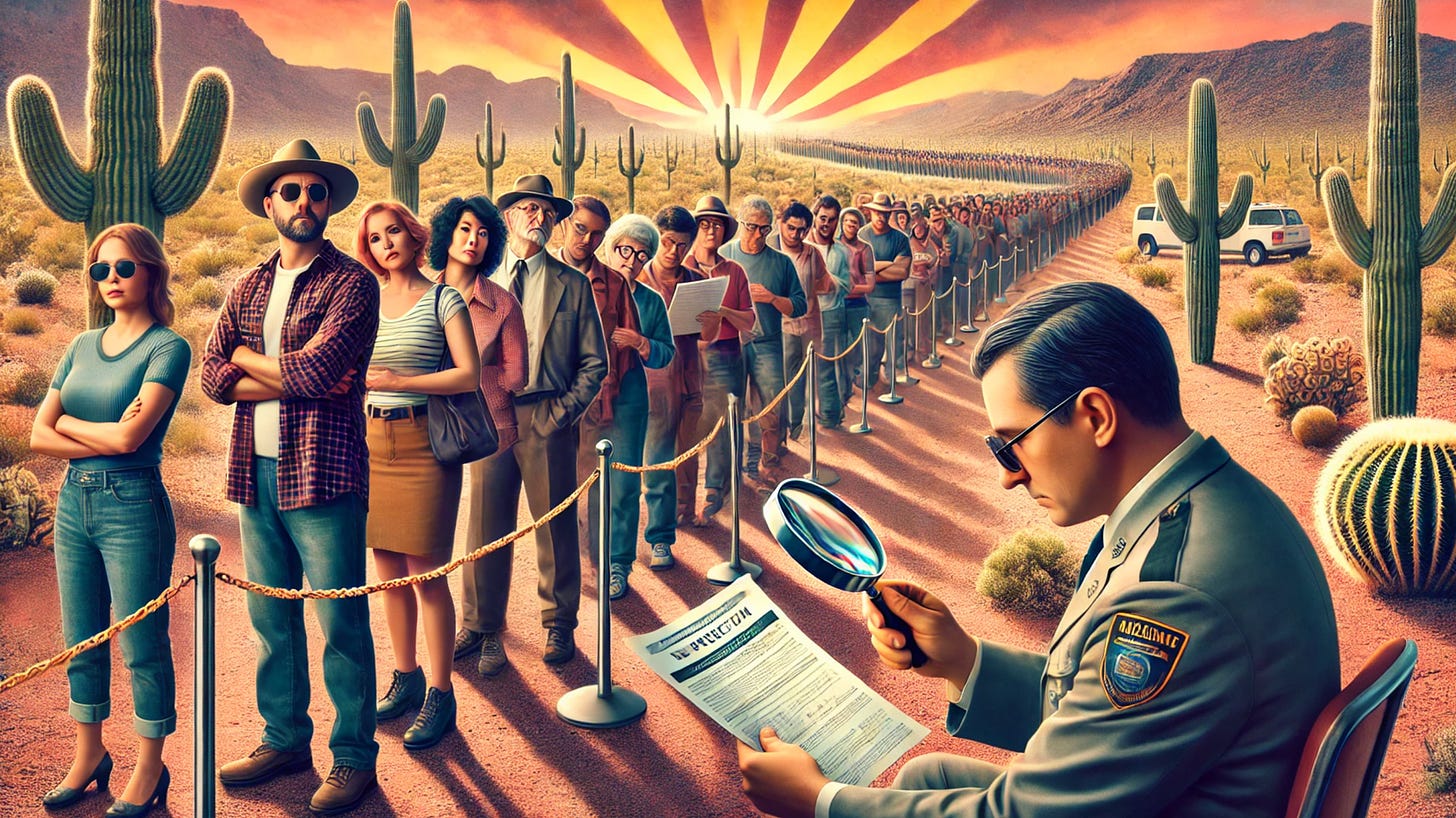
But it also triggers a lengthy process where ballot signatures have to be verified in the days following the election before they can be tabulated.
Those same-day ballot drop-offs have become the villain in the saga of Arizona’s lengthy wait times to get election results — especially when the country’s looking at Arizona as a swing state to determine who takes its highest offices.
Arizona’s vote-counting timeline has been subjected to scrutiny in the last few election cycles, like when most newsrooms called Joe Biden’s 2020 victory in Arizona nine days after Election Day, or when Hobbs was declared Arizona’s next governor the Monday after the 2022 election.
But Mesnard thinks everyone showing up to vote on Election Day should be treated the same way. Under his proposal, voters could still drop off their ballots in person on Election Day, but they’d have to wait in line and show an ID instead of having the signature on their ballot verified days after.
Since Hobbs became Arizona’s Secretary of State in 2018, she has supported the state’s flexible voting system, even at the cost of the country waiting on Arizona. She recently reiterated to reporters her support of late early ballot drop-offs.
“The issue is not that it takes too long to count ballots,” she said. “We need to be focused on making sure that we get the results right, not faster.”
Mesnard said he’s willing to work with Democratic legislators and the governor to get a faster election results timeline passed next year.
“If Governor Hobbs' position is 'I'm not going to do anything,' well then she can own the length of time it takes Arizona to count,” he said, noting the governor hasn’t come up with another solution.
But he also acknowledges bypassing another veto from Hobbs and sending the idea to voters to decide instead is “a distinct possibility, given the overwhelming support we believe it would have.”
The policy perspectives on balancing convenience and prompt results aren’t that new, and like most of Arizona’s issues, they’re partisan.
Former Republican state Sen. Michelle Ugenti-Rita ran legislation to ban dropping off mail-in ballots at the polls in 2019. Maricopa County Recorder Stephen Richer released a 28-page plan to get results out faster in 2023, which included eliminating late early ballots.
And most recently, Maricopa County Supervisor Thomas Galvin called for legislators and Hobbs to back proposals moving up the cutoff date to drop off early ballots. He calls it his “95/1” plan — getting 95% of ballots tabulated in one night, election night.
When votes trickle in so slowly that candidates begin losing after pulling in wide initial leads, mistrust tends to grow, he told us.
“I have seen after Election Day, it takes about 48 hours for people to start freaking out and questions start coming in,” he said. “I have seen certain statewide officials say, ‘Well, it's only the conspiracy theorists who ask those questions.’ It's not true. People of all political stripes are asking these questions.”
The Democratic position has remained largely unchanged through the years: Allowing more opportunities for people to vote increases participation in democracy. And making Election Day lines longer by redirecting voters with prepared ballots in their hands could be another hindrance.
Democratic Sen. Priya Sundareshan argues a new law going into effect in 2026 makes Mesnard’s bill unnecessary. That law allows those who drop off their ballots on Election Day to show their ID instead of going through the standard signature verification process, but it’s optional.
And she said Republicans are partially to blame for the long wait times this year by lengthening the ballot to two pages through ballot referrals.
“That instant gratification is no justification for depriving voters of access … It would be impossible to properly educate, I think, all the voters who are used to dropping off their ballots,” Sundareshan said.
When Mesnard’s bill was going through committees in 2023, Arizona Association of Counties Director Jen Marson told lawmakers that “cutting off no ID early voting before Election Day is a deal breaker for several of our counties.”
Marson told us she hasn’t yet gauged how counties feel about Mesnard’s proposal this time around.
They haven’t had time to discuss it because some of them are still counting ballots.
When one election ends…: Arizona Senate President Warren Petersen told the Republic’s Laurie Roberts that he is challenging Attorney General Kris Mayes for her job in 2026. That may (or may not) be difficult since state law says you have to be a lawyer for at least five years to hold the office and he was just admitted to the bar last year, though that law has been deemed unenforceable, as the Democratic Twitterati noted. There’s also speculation that Republican Sen. Jake Hoffman could take on Katie Hobbs for the governorship.
Make America deport again: As President-elect Donald Trump confirmed his plans to use the military and potentially the National Guard to carry out deportations on an unprecedented scale, Hobbs posed for a photo op at the border today, pledging to work with the incoming administration to secure it. Hobbs bumbled through questions about how she’ll handle Trump’s mass deportation plans during an interview with ABCNews, saying Arizona needs more state resources to deal with the problem.
Voters don’t speak Elvish: Democrats got hammered in this year’s election because they lost voters — literally, as the number of Democrats in Arizona shrank, and figuratively, as their messaging grew “stale,” Democratic consultant Matt Grodsky wrote in an op-ed in the Republic.
“Registering requires good messaging,” Grodsky wrote. “People aren’t choosing our party because our furthest left elements are defining our narrative and taking us off message. … We use borderline Elvish lingo birthed from think tanks that push the limits of political correctness. We lack strength and appeal in rural areas.”
Help us hire Ivy League consultants to tell us how to get you to upgrade your subscription and support local journalism.
Says the Harvard boy: Democrats got hammered in this year’s election because they didn’t talk enough about normal people’s finances, and they lost Latinos because they relied on “Ivy League candidates that hire Ivy League Latinos,” U.S. Sen.-elect Ruben Gallego, one of the few Democrats to pull off a victory in Arizona this year, said on CNN’s “State of the Union.”
12% is a small price to pay: Former Arizona Superintendent of Public Instruction Diane Douglas is pretty stoked about Trump’s idea of abolishing the U.S. Department of Education, she told talk show host James T. Harris.
“It will get rid of some money, not a large part of their budget, maybe 10% to 12% pre-COVID, but it will mean we get rid of bureaucrats making laws,” she said.
Elections have consequences: Voters sent a “host of extremists and conspiracy theorists” to the Capitol again this year, the Arizona Mirror’s Jerod MacDonald-Evoy writes, singling out, among others, Republican Sen. David Farnsworth, Janae Shamp, Wendy Rogers, and incoming Sen. Mark Finchem, who have all spewed QAnon beliefs.
On faith and flight: Followers of “The Message” — a cultish religion started in Tucson in the 1960s — bought an airplane formerly owned by First Lady Lady Bird Johnson to honor their dead prophet, William Branham, hoping he would rise from the dead to fly it. It’s just one of the many strange and unnerving stories that the Daily Star’s Tim Steller is digging into in an investigation into the religion.
“Our family revolved around that airplane. Everything they did, every extra dime they had, they were pouring it into making more money to fly the airplane, in order to get that airplane up to airworthiness,” former Message follower David Moseley said.
All hail our robot overlords: Hank is moderating a panel of tech and business folks talking about the future of AI policy, law and business in Arizona. Come check it out if you’re free at 5:30 tonight. RSVP by emailing info@ccbewise.com.
While Senate President Warren Petersen looks to challenge Attorney General Kris Mayes in the 2026 election, he won’t get a free pass in the GOP primary.
That’s right, biennial candidate Rodney Glassman is back.
His career as a Democratic Tucson City Councilman turned Republican candidate for every office under the sun is the stuff of legend — and a whole lot of jokes.
Anyway, here’s our favorite campaign music video ever.




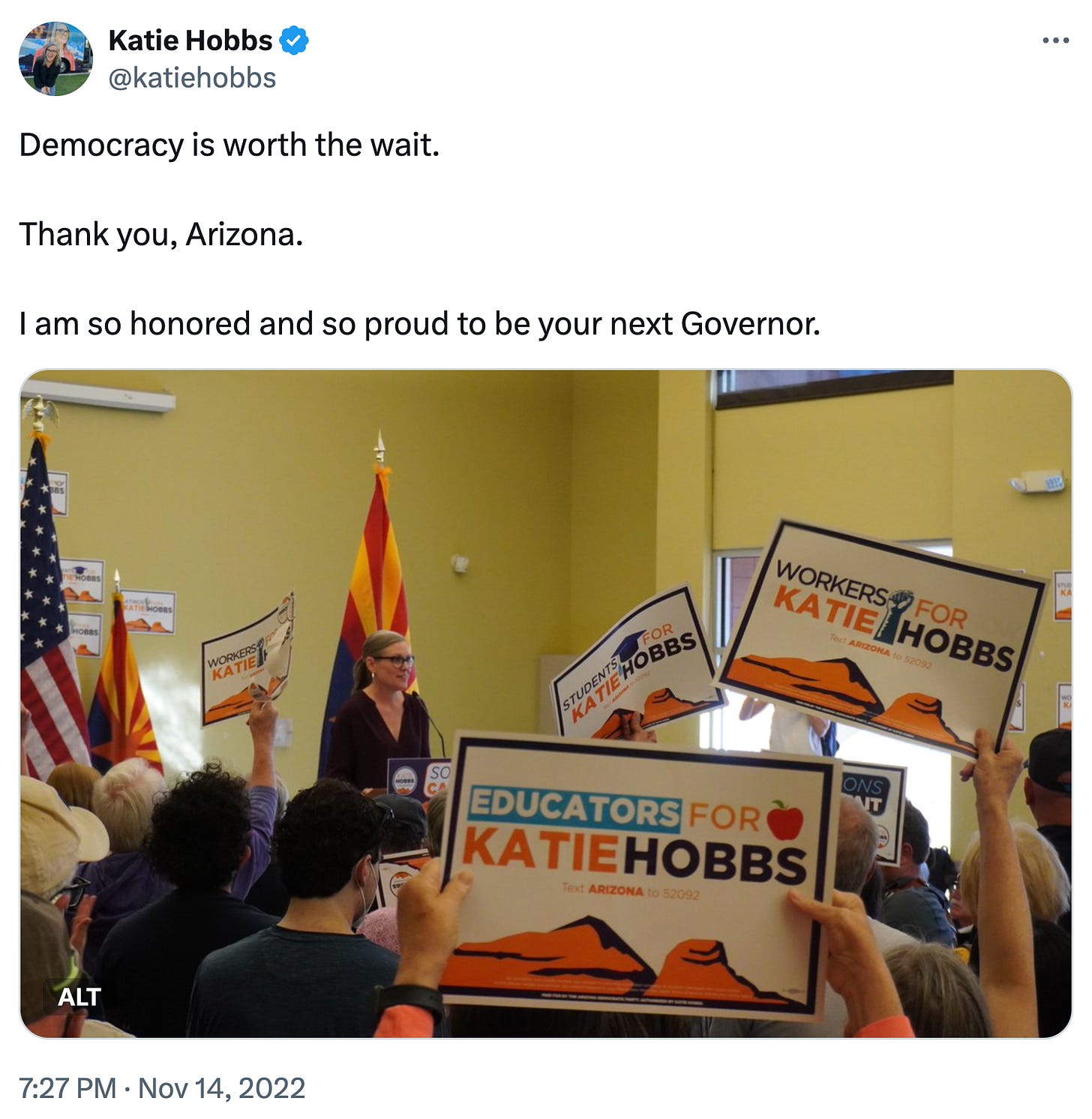
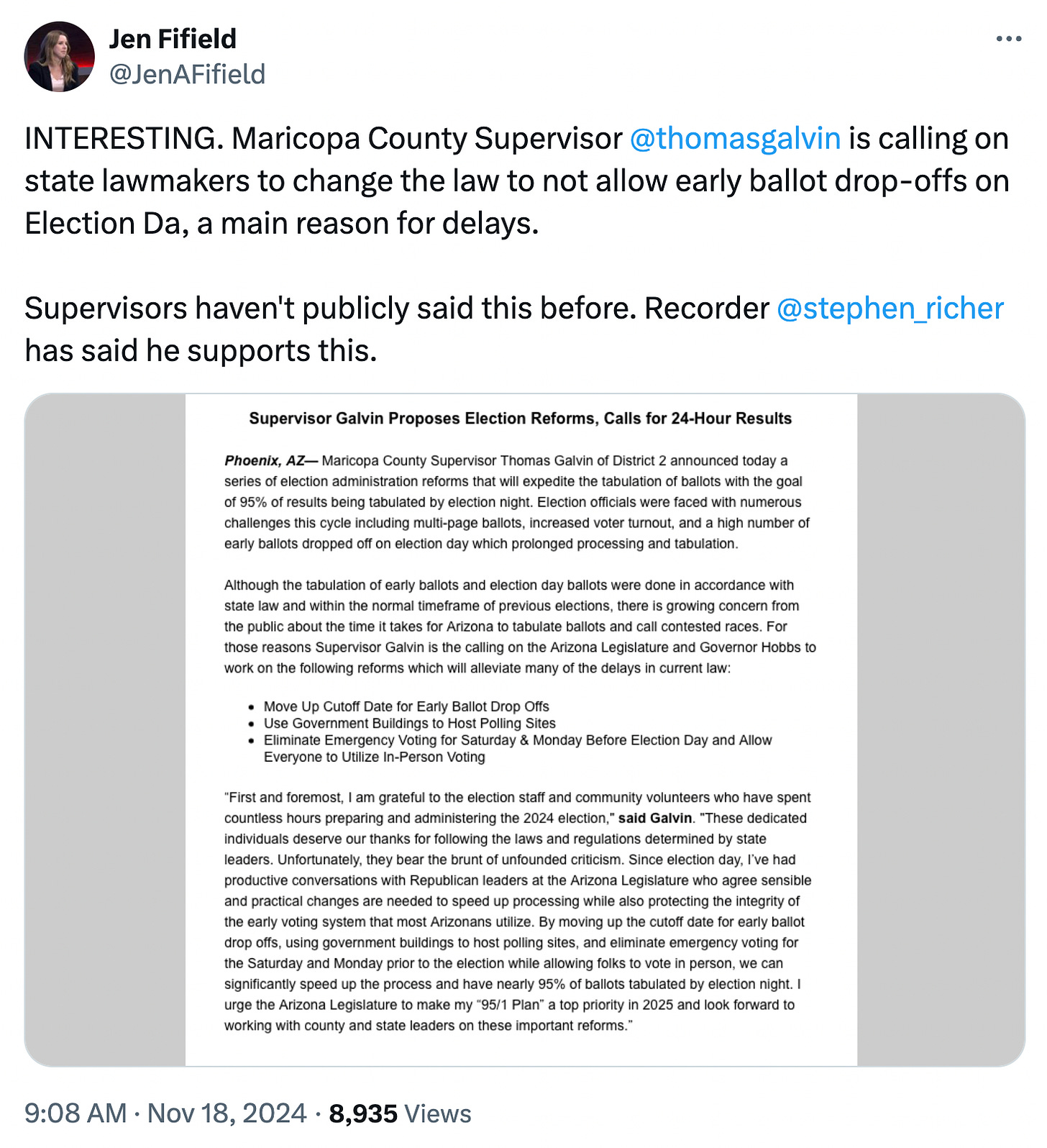


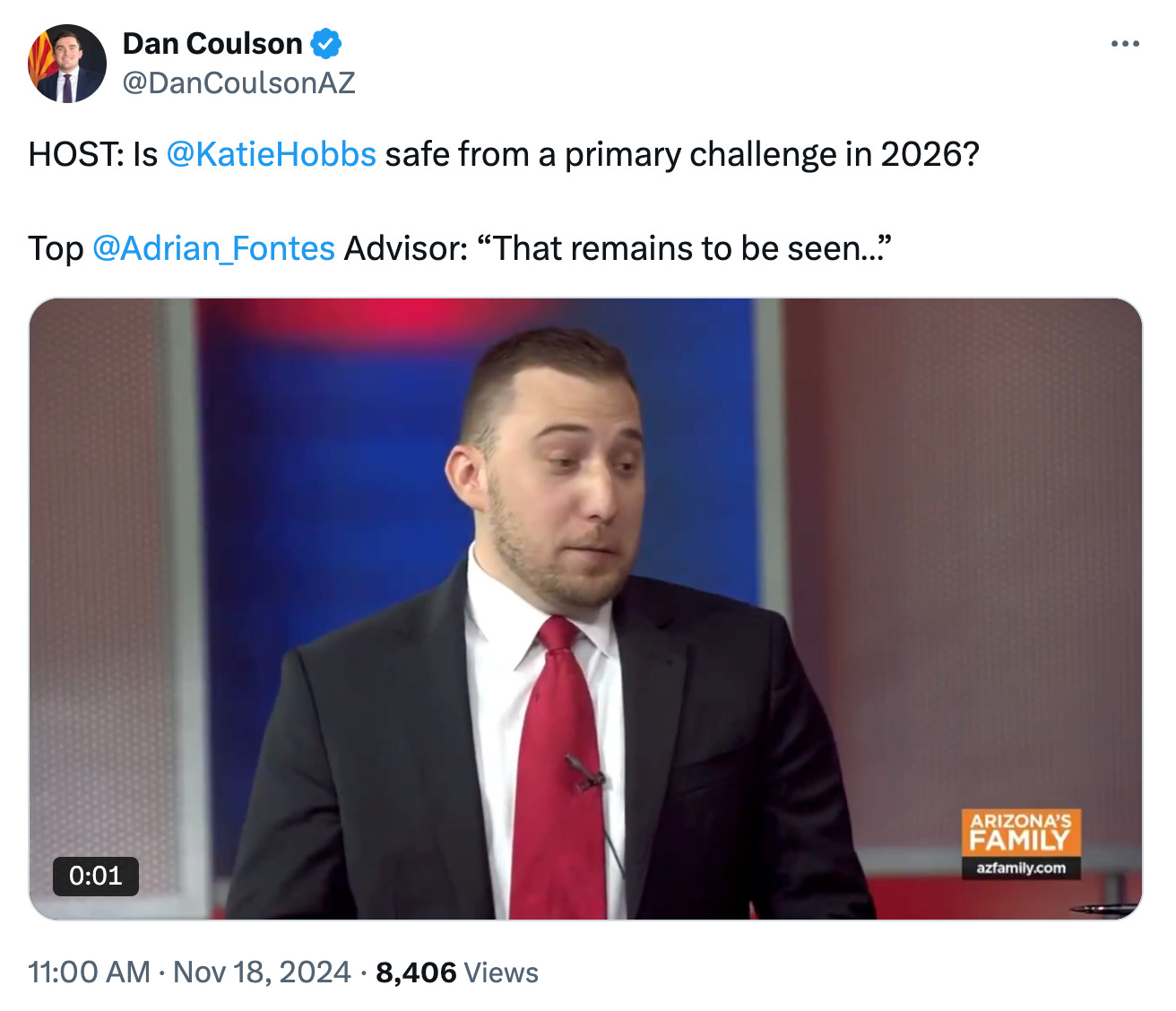
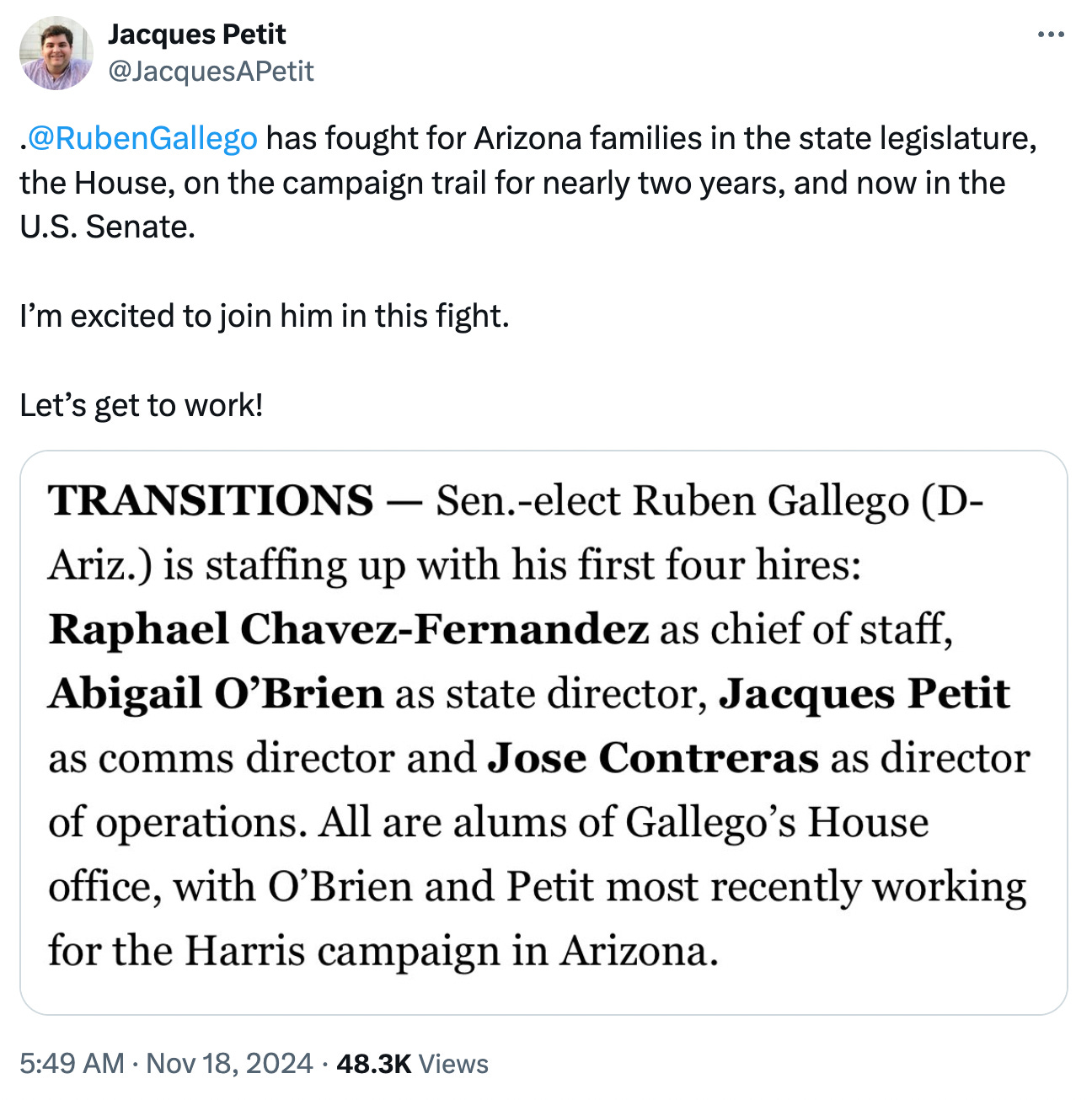







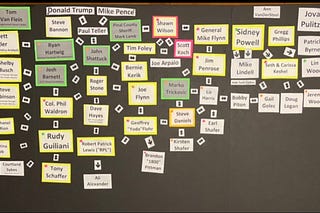

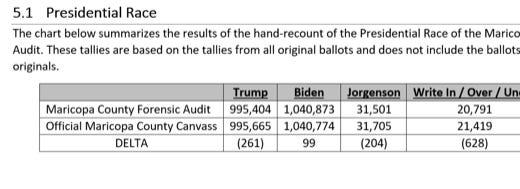

How do I enroll a friend? Thx, Phil Vander Stoep. phva00@gmail.com
Gallego & Baldwin were two beacons of blue light. Believe there are 20 GOP Senators up for re-election in '26. Will they follow Chump...or not?